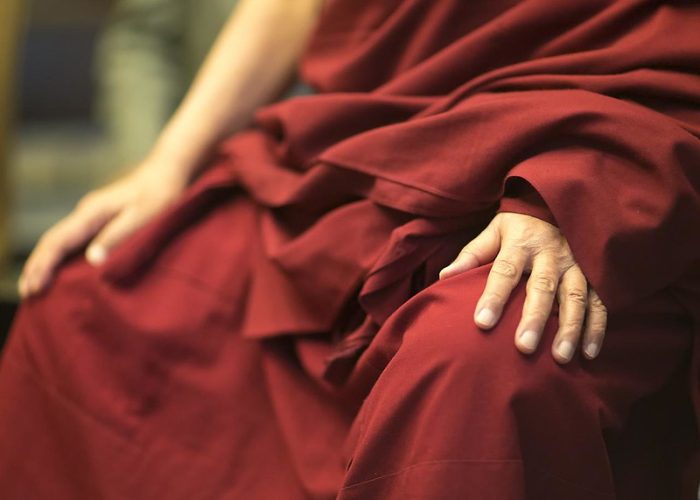Read Waylon’s initial take on the situation here. And new info, here.
Note: no one person is the voice of Elephant. Agree with the below? Disagree with the below? Inspired to share your contemplations, experiences, take—what can be helpful, critical or otherwise? Post here.
~
The most refreshing aspect of Tibetan Buddhism is that after studying the teachings for a while, we become deeply aware of the radical responsibility for our life experience.
Over the past decade, I have found this idea—that each of us sets into motion the causes and effects of our lives—both refreshing and heartbreaking.
The basis of the Buddhist teachings on how life really works is the “deeply hidden” workings of karma layered on the “hidden” workings of shunyata—the Sanskrit term for emptiness. These two concepts, especially for the Western mind, are often misconstrued and misunderstood.
Simply put, emptiness can be thought of as a limitless void out of which our experience arises and falls interdependently with other sentient beings. I think for the modern mind, a better way to describe emptiness is that of potentiality. Emptiness can be thought of as the potential white movie screen of life onto which we project our experience based on our karma.
Karma can be translated as action. Couple this with the four workings of karma, and we can move from theory to practice.
- Karma is certain. If we put a cause into action, we will experience the effect.
- Karma grows. Like a small acorn growing into a large oak tree, the causes we put out into the world will produce greater results.
- If we don’t plant the seed we cannot get the result.
- If we do plant the seed we will definitely get the result.
Like begets like, and our actions will produce similar results. Good actions result in good results; bad actions result in bad results.
However, the reason the teachings say that karma is “deeply hidden” is that karma doesn’t ripen in a linear fashion. In other words, a person can seem to be engaging in stingy and greedy actions while amassing great wealth. The karma for this wealth is coming from generous actions made in the past, as the only result we can get from greed is lack and the only way to experience abundance is through generosity.
So what does all of this have to do with the Dalai Lama?
The current circulating video of His Holiness the Dalai Lama appears to have him telling a child to “suck his tongue” in a playful, yet disturbing, manner. As I read the story and then was asked to weigh in as someone who regularly writes about and teaches Tibetan Buddhism, I must admit that I experienced a moment of dread. It was a similar feeling to when the Dalai Lama made a seemingly sexist remark about wishing that the next Dalai Lama was a good looking female. It felt “off” from the generally kind-hearted man who sits squarely at the head of my lineage.
What the hell could I say that might be helpful?
As my mind turned over the teachings, it occurred to me that this was a perfect moment to remember that everything we experience is an opportunity to learn anew and to use it to clean up our own act. Because morality is sexy.
Can I say anything useful to explain what the Dalai Lama was thinking or doing or if this absurdity is a reflection of a deep character flaw or worse? Honestly, no. Though I do think that Elephant Journal founder, Waylon Lewis, did a thoughtful job in his article.
I wasn’t present for this strange event and I don’t know the inner workings of the Dalai Lama’s mind. I only know the inner workings of my mind. In fact, I can really only use this moment to examine my own mind, my own life, and my own karma. Rather than judging others, our experiences are an invitation to turn toward ourselves with curiosity.
If I’m honest, I make awful mistakes all day long. If someone planted a video camera on me, I’d often be mortified. I’m not above it. I’m not special. In this sense, neither is the Dalai Lama. Am I suggesting that we’re all off the morality hook because we are all fallible?
Not a chance.
I am actually suggesting the exact opposite.
Rooting ourselves in the workings of karma, cause, and effect, we have to accept that if we see violence in our world, we need to clean up the violence we enact on others. If we are experiencing joy in our world, we have created these conditions by giving joy to others. If we want more love, we need to give greater love and so forth. In this context, if we want to see wholehearted actions from others, we have to clean up all the little ways we ourselves act inappropriately. We have to examine the video being projected on our own life’s movie screen.
The lesson I am taking from the Dalai Lama’s scandal is that I have more work to do. I can’t change the present moment—that karma is already ripening. I can only positively affect my future and that happens by bringing out the morality broom to sweep up the dust in my life.
Will you join me?
~
Please consider Boosting our authors’ articles in their first week to help them win Elephant’s Ecosystem so they can get paid and write more.
~

 Share on bsky
Share on bsky







Read 23 comments and reply